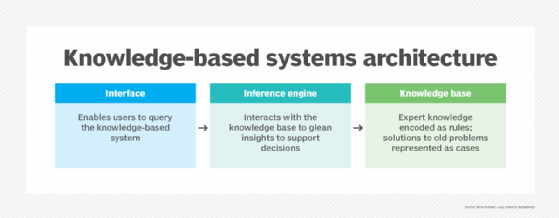What are knowledge-based systems (KBSes)? (original) (raw)
By
- Alexander S. Gillis,
- John Moore, Industry Editor
Published: Jan 27, 2025
Knowledge-based systems (KBSes) are computer programs that use a centralized data repository known as a knowledge base to provide problem-solving. Knowledge-based systems are a form of artificial intelligence (AI) designed to capture the knowledge of human experts to support decision-making. An expert system is an example of a knowledge-based system because it relies on human expertise.
KBSes can assist in decision-making, human learning and in creating a companywide knowledge-sharing platform. KBS can be used as a broad term, but these programs are generally distinguished by representing knowledge as a reasoning system to derive new knowledge.
A basic KBS uses a knowledge base and an interface engine. The knowledge base contains a collection of information in a given field -- such as medical data. The inference engine processes and locates data based on requests, similar to a search engine. A reasoning system draws conclusions from the data provided and makes decisions based on "if-then" rules, logic programming or constraint-handling rules. Users interact with the system through a user interface.

Knowledge-based systems represent a rules- or case-based approach to AI.
Knowledge-based systems are commonly used to solve complex problems and to support human learning. KBSes have been developed for numerous applications, such as the following:
- Healthcare. An early knowledge-based system, Mycin, was created to help doctors diagnose diseases, for example. Healthcare has remained an important market for knowledge-based systems, which are now referred to as clinical decision support systems in the context of health sciences.
- Education and training systems. These systems might include a KBS, as they can provide personalized instruction and feedback to users based on training needs or performance.
- Legal systems. A knowledge-based system used in legal settings, also called a legal expert system, are used to collect, reference and provide expert knowledge on specific legal topics. They are meant to simulate the decision-making abilities of an expert in the field of law.
Knowledge-based systems have also been used in diverse applications such as avalanche path analysis, industrial equipment fault diagnosis and cash management.
Knowledge-based systems and artificial intelligence
AI enables the inner workings of KBS systems to gain and use knowledge. But while classical knowledge-based systems are a subset of AI, they differ in their approach to some of the newer developments in AI.
AI is organized in a top-down system that uses statistical pattern detection methods such as big data, deep learning and data mining. AI, in this sense, includes neural network systems that use deep learning and focus on pattern recognition problems such as facial recognition. By comparison, KBSes handle large amounts of unstructured data while integrating knowledge based on that data on a large scale.
Types of knowledge-based systems
Some examples of knowledge-based systems include the following:
- Blackboard systems. These systems enable multiple sources to input new information into a system to help create solutions to potential problems. Blackboard systems rely heavily on updates from human experts.
- Case-based systems. These systems use case-based reasoning to explain problems. They work by reviewing past data of similar situations.
- Classification systems. These systems analyze different data to understand its classification status.
- Eligibility analysis systems. These systems are used to determine a user's eligibility for a specific service. The system asks a user guided questions until it receives a disqualifying answer.
- Expert systems. These are a common type of KBS that simulate human expert decision-making in a particular field. Expert systems provide answers for problems, as well as the explanations behind them. For example, they could be used for calculations and predictions.
- Intelligent tutoring systems. These systems support human learning and education by providing users with instructions and giving feedback based on performance or questions.
- Medical diagnosis systems. These systems help diagnose patients by inputting data or having a patient answer a series of questions. Based on the responses, the KBS provides a diagnosis and makes recommendations that medical professionals can use to determine a patient's treatment.
- Rule-based systems. These systems rely on human-specified rules to analyze or change data to reach a desired outcome. For example, rule-based systems might use "if-then" rules.
Advantages and challenges of knowledge-based systems
Knowledge-based systems offer the following benefits:
- Aid in expert decision-making, especially when a human expert isn't available.
- Provide efficient documentation for quick user access.
- Create new knowledge by referring to and reviewing existing stored data.
- Group data by analyzing and classifying different data.
- Handle large amounts of structured and unstructured data.
- Improve decision-making processes so users can work at higher levels of expertise.
- Can improve the efficiency and effectiveness of an organization's training processes. Employees can also search for and revisit training materials when needed.
- Preserve employee knowledge by having all relevant knowledge stored in a searchable system, which can avert knowledge gaps when skilled employees leave.
- Run in the cloud, making the KBS accessible to remote workers.
However, the following are some potential challenges that come with these systems:
- Difficult to maintain, as some systems might require continual updating and organizational policies, or procedures might change and require updating over time.
- Potential anomalies such as circular dependencies or repetitive rules might appear in some systems.
- Require a large amount of accurate data.
- Require training for new users to understand the system.
- Some data could be considered abstract, making it difficult for a system to make decisions.
- System quality is only as good as the quality of data put into it.
How to select a knowledge-based system
Before selecting a knowledge-based system, an organization must consider the following factors to ensure a KBS matches its needs:
- What will the KBS be used for? Is it needed for decision-making, retrieving information, training or decision making, for example.
- The specific type of KBS needed. An expert system would provide recommendations that mimic those of a human, for example. A rule-based KBS would apply rules to data to reach a desired answer to inquiries.
- Technical requirements. Is it compatible with the organization's current hardware and what software integrations will be needed?
- The flexibility or scalability of the KBS.
- Ease of use. This applies to end users, as well as maintenance and knowledge entry.
- Initial and continued costs.
Continue Reading About What are knowledge-based systems (KBSes)?
- How do big data and AI work together?
- Types of AI algorithms and how they work
- AI transparency: What is it and why do we need it?
- The different types of AI explained
- Content collaboration platforms for enterprises
 Does your organisation need an AI librarian?
Does your organisation need an AI librarian?  By: Shania Kennedy
By: Shania Kennedy  expert system
expert system  By: Ben Lutkevich
By: Ben Lutkevich